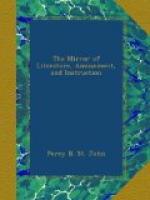The interior of the castle contains little worth notice except a full-length portrait of Charles XII. of Sweden, said to be an original, and brought here by one of the Jeffreys’ family who was envoy to that monarch.
* * * * *
THE ANNUALS.
“Flow’rets
strew’d
By churlish Time, in cheerlier mood;
The sweetness of a second
Spring,
Beneath the Autumn of his wing.
Bestowing on the season’s
gloom
The bliss of a perennial bloom.”
Glancing back to the commencement of the nineteenth century, the only annual record of poetry and prose which we recollect, was “The Flowers of Literature;” a thick duodecimo, habited in a flesh-coloured wrapper, and retaining in its print and pages, the quaintness which characterized “the good old days” of the “Universal Magazine;” and which still clings, though somewhat modified, to the patriarchal pages of Sylvanus Urban. The matter was in accordance with the manner—a medley of prosing articles, from the titles of which we might select, as indicative of their style, “Ode to Despair;” “Topographical Description of Paris;” “The Sailor;” more agreeably interspersed with some effusion of Mrs. Barbauld, or Mrs. Opie; mingled, again, with sundry “Observations on the Present State of the War,” written by some sleepy newspaper editor, whose language we might assimilate with, “We have received intelligence from,” &c. Here and there, perhaps, a straggling beam of genius broke through the mental twilight, in the shape of, “Some Account of the poet, Burns;” a Rustique by Bloomfield, or an elegant sonnet by Bowles or Charlotte Smith. The rest of would-be-sonneteers, tragedy-writers, and essayists, have long ago found, with their mediocrities, a congenial oblivion in “the tomb of all the Capulets.”
But suddenly, and without much premise to warrant the commencement of such an era, the department of our imaginative literature was established in patronage and importance; and those “trivial, fond records,” which were wont only to sparkle a brief endurance in the mutable columns of a newspaper, or doomed, when existing in fragile manuscript, “to die and be forgot,” found a refuge from their Lethean fate in the numerous Magazines which the increased taste, and avidity for reading, evinced by the public, had called into existence. Still there was a desideratum, which these adornments of English Literature, “The Annuals,” alone supplied. The casual tones which emanated from the “transcendent masters of the lyre,” were not to be lost to “the public ear” for want of “a circulating medium;” and Ackermann, a name familiar to the lovers of pictorial art, had the honour of first setting England the example of preserving her valuable anthology, by producing his attractive Annual, “The Forget-Me-Not;” a species of literature which presents us with the pleasing facility of holding yearly communion with




